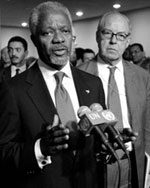UN gives Bush potential go-ahead to attack Iraq
- Text of Iraq’s letter to UN Secretary Gen. Kofi Annan –Iraqi News Agency (11/13/02)
- Full text of UN Resolution 1441 (Adobe PDF Format from UN)
- U.S. dollars bought UN vote on Iraq
- Iraqi National assembly debates UN resolution -Iraqi News Agency

UNITED NATIONS (FinalCall.com)–”The dictator of Iraq will disarm or America will lead a coalition to disarm him,” President Bush reaffirmed during a Nov. 11 Veterans Day speech at Arlington National Cemetery.
The strong remarks to Iraqi President Saddam Hussein came on the heels of a unanimous vote in the United Nations Security Council giving UN weapons inspectors “immediate, unimpeded and unconditional” power to return to Iraq. The resolution arms the inspectors with tougher rules that say they can check any site, including President Saddam Hussein’s palaces.
Meanwhile, Iraq’s parliament was discussing UN Resolution 1441 during an emergency session at Final Call press time. Iraqi leaders are up against a Nov. 15 deadline to tell the world body if they will comply with the resolution’s demands. Some Arab leaders welcomed the resolution and indicated that Baghdad appeared to be moving toward accepting the language of the document.
Russia, which with France and China fought hard for amendments to an original U.S. draft resolution, said it hoped the Iraq’s parliament would vote to comply.
“In the first place, it would serve the interests of the Iraqi people, and also it would help strengthen peace and security in the whole Gulf region,” Foreign Ministry spokesman Alexander Yakovenko said in a statement.
The United States has warned Iraq that one false step would result in military action.
National Security Advisor Condoleezza Rice told NBC’s “Meet the Press” program that President Bush said that Saddam Hussein will be held to a “zero tolerance” standard on inspections and that President Bush reserved the right to use force without Security Council approval if Iraq violated the resolution. She said that Washington would initially discuss with the Council the consequences of any breach.
Observers say the issue of unimpeded access to any site could remain a point of dispute with the government in Baghdad arguing its sovereignty is at stake.
If Iraq complies with the resolution, it will have 30 days to reveal all programs aimed at weapons production. The inspectors must be allowed 45 days to complete their work. The Security Council gave the inspectors 60 days to report back to the world body. Chief UN weapon’s inspector Hans Blix told reporters he would be ready to leave for Iraq on Nov. 18.
“This is a time of trial–for Iraq, for the UN and for the world,” said UN Secretary General Kofi Annan, after the vote. Iraq has a “new” opportunity to comply with all resolutions of the Security Council, Mr. Annan said. “I urge the Iraqi leadership for the sake of its people to seize this opportunity to bring to an end the suffering of its people.”
The Security Council debated the new resolution for eight weeks due to France’s demand that war should not be the automatic result of a failure by Iraq to abide by Resolution 1441.
Jean-David Levitte, France’s UN ambassador, argued that the resolution strengthened the role and authority of the Security Council. That was the main objective for France throughout the negotiations, Mr. Levitte said.
Adolfo Aguilar Zinser, Mexico’s ambassador to the UN, said the resolution preserved the neutrality and impartiality of the United Nations inspectors and strengthened the principle that the inspectors must report to the Security Council, not to individual nations.
Africa’s two representatives on the 15-member Security Council–Mamady Traore of Guinea and Martin Belinga Eboutou of Cameroon–agreed that the resolution reaffirmed the key role of the Security Council in maintaining international peace. “This was a real compromise, without a victory for any side,” Ambassador Eboutou said.
But many diplomats said the U.S. was the real winner. Some Asian diplomats said only the U.S. could pull off such a coup. They said the 15-0 vote was obtained through considerable political and diplomatic pressure-lobbying that was not conducted at UN headquarters in New York, but in various capitols.
“The United States threatened the loss of access to aid or future aid to nations that did not support the UN resolution,” charged Richard Becker of the International A.N.S.W.E.R. organization.
“The Bush administration is not interested in weapons inspections,” said Medea Benjamin, director of the San Francisco-based United for Peace Coalition. “The UN bowed to U.S. pressure, and the resolution merely provides a cover for President Bush to conquer Iraq.”












